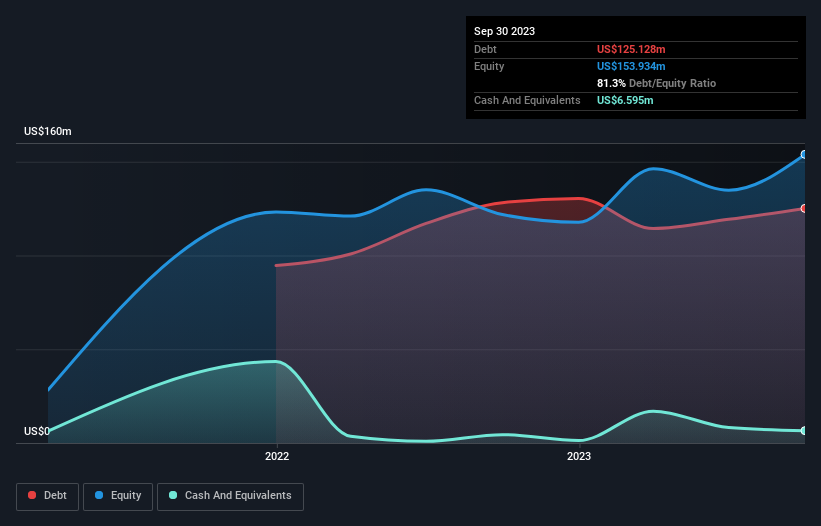Howard Marks put it nicely when he said that, rather than worrying about share price volatility, 'The possibility of permanent loss is the risk I worry about... and every practical investor I know worries about.' When we think about how risky a company is, we always like to look at its use of debt, since debt overload can lead to ruin. Importantly, TeraWulf Inc. (NASDAQ:WULF) does carry debt. But should shareholders be worried about its use of debt?
Why Does Debt Bring Risk?
Debt and other liabilities become risky for a business when it cannot easily fulfill those obligations, either with free cash flow or by raising capital at an attractive price. If things get really bad, the lenders can take control of the business. However, a more common (but still painful) scenario is that it has to raise new equity capital at a low price, thus permanently diluting shareholders. Of course, plenty of companies use debt to fund growth, without any negative consequences. When we think about a company's use of debt, we first look at cash and debt together.
See our latest analysis for TeraWulf
What Is TeraWulf's Net Debt?
As you can see below, TeraWulf had US$125.1m of debt, at September 2023, which is about the same as the year before. You can click the chart for greater detail. However, it does have US$6.60m in cash offsetting this, leading to net debt of about US$118.5m.

How Healthy Is TeraWulf's Balance Sheet?
According to the last reported balance sheet, TeraWulf had liabilities of US$108.5m due within 12 months, and liabilities of US$49.4m due beyond 12 months. Offsetting these obligations, it had cash of US$6.60m as well as receivables valued at US$2.72m due within 12 months. So it has liabilities totalling US$148.5m more than its cash and near-term receivables, combined.
TeraWulf has a market capitalization of US$521.7m, so it could very likely raise cash to ameliorate its balance sheet, if the need arose. But it's clear that we should definitely closely examine whether it can manage its debt without dilution. When analysing debt levels, the balance sheet is the obvious place to start. But it is future earnings, more than anything, that will determine TeraWulf's ability to maintain a healthy balance sheet going forward. So if you want to see what the professionals think, you might find this free report on analyst profit forecasts to be interesting.
In the last year TeraWulf wasn't profitable at an EBIT level, but managed to grow its revenue by 916%, to US$56m. When it comes to revenue growth, that's like nailing the game winning 3-pointer!
Caveat Emptor
While we can certainly appreciate TeraWulf's revenue growth, its earnings before interest and tax (EBIT) loss is not ideal. To be specific the EBIT loss came in at US$38m. When we look at that and recall the liabilities on its balance sheet, relative to cash, it seems unwise to us for the company to have any debt. Quite frankly we think the balance sheet is far from match-fit, although it could be improved with time. Another cause for caution is that is bled US$60m in negative free cash flow over the last twelve months. So in short it's a really risky stock. When analysing debt levels, the balance sheet is the obvious place to start. But ultimately, every company can contain risks that exist outside of the balance sheet. For instance, we've identified 3 warning signs for TeraWulf (1 is a bit unpleasant) you should be aware of.
If you're interested in investing in businesses that can grow profits without the burden of debt, then check out this free list of growing businesses that have net cash on the balance sheet.
Valuation is complex, but we're here to simplify it.
Discover if TeraWulf might be undervalued or overvalued with our detailed analysis, featuring fair value estimates, potential risks, dividends, insider trades, and its financial condition.
Access Free AnalysisHave feedback on this article? Concerned about the content? Get in touch with us directly. Alternatively, email editorial-team (at) simplywallst.com.
This article by Simply Wall St is general in nature. We provide commentary based on historical data and analyst forecasts only using an unbiased methodology and our articles are not intended to be financial advice. It does not constitute a recommendation to buy or sell any stock, and does not take account of your objectives, or your financial situation. We aim to bring you long-term focused analysis driven by fundamental data. Note that our analysis may not factor in the latest price-sensitive company announcements or qualitative material. Simply Wall St has no position in any stocks mentioned.
About NasdaqCM:WULF
TeraWulf
Operates as a digital asset technology company in the United States.
Slight risk with limited growth.
Similar Companies
Market Insights
Community Narratives




